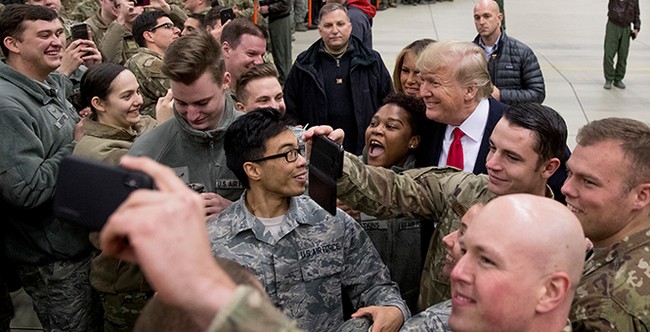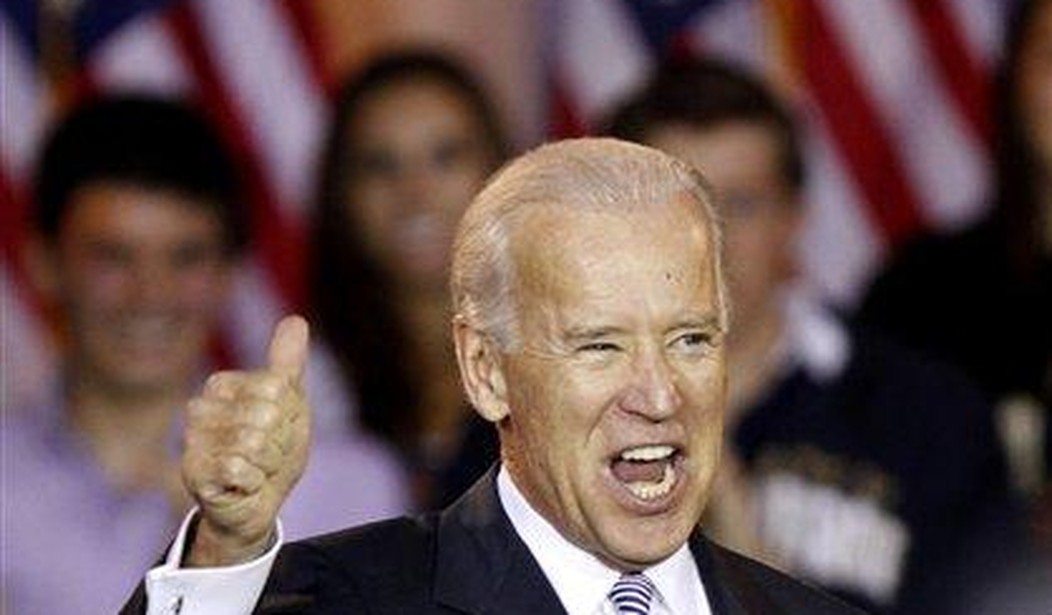Much of the growing concern about President Joe Biden’s overall decline has focused on his obvious speech and physical challenges.
They are, indeed, concerning, scary, and, yes, clearly worsening. We see his garbled mind and words in the Oval Office cocoon and virtually every time he ventures outside.
The other day, for instance, the president of the United States told a Pennsylvania campaign audience, "My mom didn't live in Scranton since she was 1954." And he continued on.
Such signs of a muddled mind, combined with his worsening physical abilities, continue. Yet no one does anything about this smoldering national security threat except handlers change his shoes, steer him to shorter airplane stairs, and provide very simple, detailed crib notes that he still screws up.
For no apparent reason, in speeches, this president will yell or whisper, then salute an invisible someone in a field. In a blackly humorous way, Biden's blithe glide through garbles and nonsequiturs can seem entertaining. Forgotten now are times when some might even like a president.
Less noticed, however, and far more dangerous for our country’s future is the larger message of national weakness that this glassy-eyed, 81-year-old, serial liar projects repeatedly to a world replete with adversaries. They are eager and ready to take advantage of the once unchallenged superpower that now has a daft commander in chief for at least nine more months, absent some intervention.
The threats are not all visible yet. More seem certain to emerge as the window of perceived American weakness and opportunity narrows to the election and potential change of administrations in January.
The threats are mounting, and we see almost daily evidence in news reports from abroad as the United States and other closely allied countries come under attack in large part because our perpetually dazed commander in chief projects inviting weakness.
The assaults on Israel by Hamas in October, and now Iran, were followed not by Biden’s outright, ongoing, and unequivocal support.
They were followed instead by public kibitzing, leaked criticisms, and warnings from this White House about the tactics and intentions of the only functioning Mideast democracy and our closest ally there.
When the United States was attacked on 9/11, every single NATO ally provided public, military, and logistical support through troops, materiel, and advisory personnel at great cost in treasure and blood. Allies who were not attacked on 9/11 suffered fully one-third of the Afghan war dead.
Not one ally warned the U.S. publicly: “Don’t overreact now.” “Be careful.” “How could your FBI miss so many Saudis on tourist visas taking jumbo-jet flying lessons?” “Why didn’t you see this coming?”
To be sure, Secy. of State Antony Blinken did recently tweet:
The United States condemns Iran’s attack on Israel. As the President said, our commitment to Israel’s security against threats from Iran is ironclad.
But then Friday, Blinken, a former John Kerry aide, stressed that the U.S. is not involved in any Israeli offensive operations.
Why say such a thing? How ironclad does that sound?
That statement was clearly aimed at U.S. Muslims and Hamas supporters – I mean, voters – who’ve been street-demonstrating widely against Israel, blocking major thoroughfares and bridges.
Blinken could have ignored that question and instead addressed the world’s largest exporter of terrorism by saying something like: “You better think about U.S. power before you go attacking our allies."
Why not make the Persian troublemakers ponder what the United States might or might not do?
But that’s clearly more assertive than desired by Joe Biden, who has given Iran billions in sanctions relief recently.
To be fair, instead of attacking Biden for his Iran policies last week, Donald Trump also could have acted like a leader and said something on the order of: “Iran should never mistake anything in American politics for lack of support for the great nation of Israel.”
For some reason, both Biden and Barack Obama have consistently demonstrated an inexplicable desire to appease Iran.

In September, against long U.S. refusals to ransom hostages, Biden released $10 billion in frozen Iranian oil money in exchange for five Americans. Previously, he traded a top Soviet spy for a WNBA player who tried to transit Russia with marijuana.
In 2009, without consulting Eastern European allies, Obama unilaterally canceled an anti-missile defense network there, anticipating future Iranian ICBMs headed for the U.S.
Forget U.S. defense. Obama’s goal was to lure Russia’s Vladimir Putin into encouraging Iran to lay off its terrorism plots and nuclear ambitions. Putin took that gimme and sold Iran a nuclear reactor and weapons.
Then, Obama and John Kerry, with others, negotiated a so-called nuclear pact to postpone Iran’s nuclear mass-weapon plans, offering bounteous rewards up-front.
Trump withdrew from the pact, saying it was one of the worst agreements ever. He placed sanctions on Iranian leadership, which rarely changes national behavior.
Three weeks before Trump left office, Qassem Soleimani, a top Iranian general responsible for the deaths of hundreds of U.S. troops, showed up in Baghdad. Trump authorized his elimination by Hellfire missile.
After Iran’s massive but unsuccessful missile attack on Israel last week, during a break in his New York trial, Trump claimed it would never have happened if he was still in office.
There is no proof of that, of course. But other previous global events lend some credibility to the claim. Putin annexed two provinces of Georgia in the summer of 2008. Protests ensued.
In 2014, during the second term of Obama and Biden, Putin annexed Crimea and a large portion of eastern Ukraine. More international protests and sanctions, which also changed nothing.
However, for all his personal weaknesses, Trump was perceived internationally as tough and unpredictable in a useful diplomatic sense where you want adversaries to be wary. You will note that during Trump’s term, Putin undertook no new annexation actions.
In fact, Trump’s White House tenure was the first in many that the U.S. did not become involved in prolonged overseas military activities. And as promised in his campaign, Trump reversed Obama’s status quo policy and ordered the ISIS caliphate crushed. Defense Secy. James Mattis saw to it.
During Obama’s presidency, without notifying Congress, the Nobel Peace Prize winner joined the European military effort to overthrow Libyan dictator Muammar Qaddafi. This despite promises the West would leave him alone if he surrendered his nuclear weapons program, which he did.
As a gloating Secy. of State Hillary Clinton succinctly put it: “We came. We saw. He died.”
Later, Obama said that Syrian use of chemical weapons on civilians would be “a red line” that would change his thinking on staying out of that civil war. President Bashir Assad called his bluff. And Obama did nothing.

In April of 2017, three months into Trump’s term, in defiance of U.S. warnings, Syria once again used chemical weapons to kill civilians en masse.
Trump promptly authorized a Tomahawk missile attack on the Shayrat Airbase, where the attack originated. Three days later, 59 missiles launched from U.S. craft in the Mediterranean Sea. Two failed. The others destroyed much of that base.
Then, Trump left office in January of 2021. One month later, Putin began assembling forces to invade Ukraine. The unprovoked assault began Feb. 24, 2022, in full violation of the Budapest Memorandum insuring Ukraine’s security in return for surrendering its Soviet nuclear weapons arsenal.
Since then, the U.S. has provided more than $75 billion in aid to Ukraine, about 75 percent of what NATO countries have.
Without such assistance, Ukraine likely would already be fully conquered.
What has concerned many is Biden slow-walking delivery of the more decisive weapons – ATACMS missile system, heavy tanks, F-16s – when swifter decisions and deliveries process could have been decisive militarily.
Instead, Biden’s fear of provoking Putin has contributed to what often appears a stalemate. This greatly benefits Russia, which has more resources, including military-age men, to throw into battle while awaiting allied battle fatigue to wither Ukraine’s international support.
Understandably, Putin has said publicly he would prefer a second Biden term because the Democrat operates more traditionally.
Finally, the other day, I came across a little-noticed February joint news conference in Tirana with Blinken and Albanian Prime Minister Edi Rama.
As someone who grew up when Albania was a rock-solid, hard-core Communist satellite, I could hardly believe my eyes and ears.
Rama was a student leader in Albania's return to democracy, a painter and professor of art, and, at 6'-7", a former member of Albania's national basketball team.
I found his remarks fascinating because, to Blinken’s apparent dismay, the host Albanian leader offered, unsolicited, some eloquent, surprising, and unusually refreshing observations by a foreign leader on U.S. politics and former President Trump.
I’ll embed the video below. The portion I quote here comes at the 38:14 mark. I wish an American leader could someday speak so well in a foreign language. I recommend a listen. It's not long.
The full transcript is here.
Albania’s Prime Minister Rama said:
If you want me to have a take on the American Congress and Senate, I think I should not go there, because let’s say that the American politics nowadays is not at its best.
But one thing I can say, I had the privilege to be prime minister for Albania in NATO when the former president was there. And despite the rhetoric, despite the colorful way to confront adversaries, I don’t see that NATO was weakened.
On the contrary, what was decided before continued to be the case. Every country continued to put more money and to put more effort in increasing the NATO budget.
So now, elections are elections, Trump is Trump. American politics is American politics.
But I think United States is something more than that. And what makes United States one of a kind in our community of countries and of people all around the world, is that United States cannot and will never, in my view, shy away from what are the principles and the values to be protected, whatever it takes.
And so I’m not afraid of anything, but of stopping or wavering to continue and protect ourselves.













